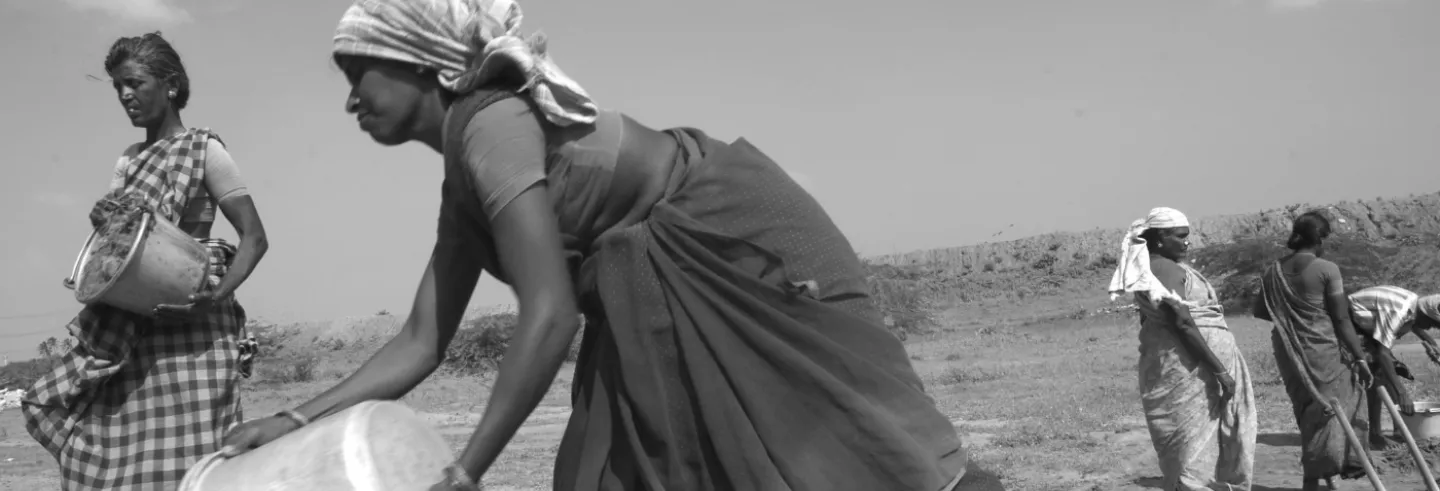Introduction
The Government of Tamil Nadu has always been keen on implementing the Mahatma Gandhi National Rural Employment Guarantee Act (MGNREGA) in the state because it clearly understands its importance to the rural poor. Politicians in the state across the spectrum have also demanded that the rural employment scheme based on the Act be strengthened.
Tamil Nadu is usually among the top three states in India in terms of expenditure on the rural employment guarantee scheme and it provides more days of work per household than the all-India average. The percentage of person-days allotted to women workers as a share of total person-days is among the highest in the country (86% compared to the all-India average of 57%). The percentage of workdays provided to Scheduled Caste and Scheduled Tribe households is around 30%, which is higher than their share in the total population (21%). The percentage of days allotted to differently abled persons is the highest in the country (1.4%). A good administration has helped the state better manage the programme than most other states despite frequent technical disruptions by the union ministry of rural development.
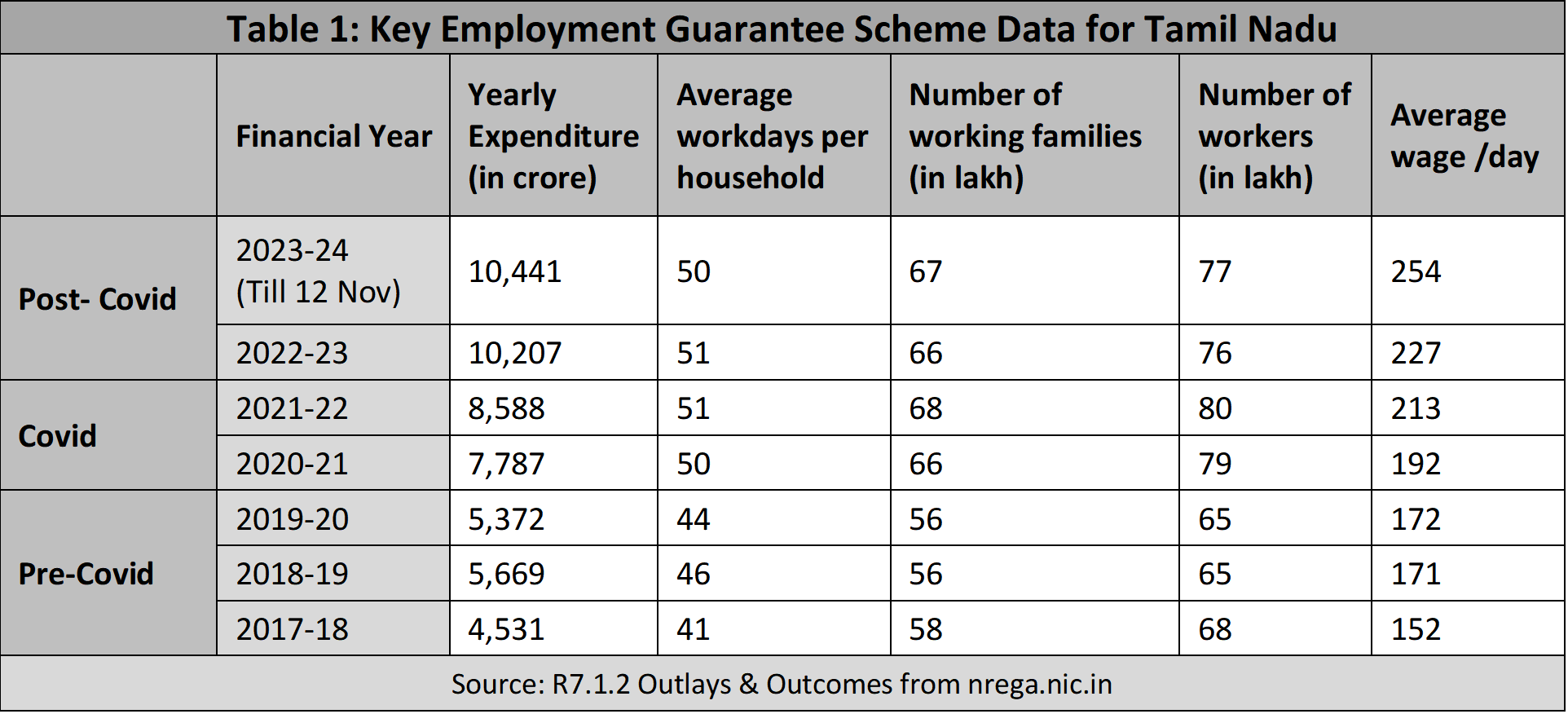
In the three years before Covid-19 (2017 to 2020), the average number of days of work provided to a working household in Tamil Nadu was 44. During the Covid-19 years and after, this increased to 50 days per year—it was already 50 days in mid-November this year. The number of households that worked in the three years before Covid-19 averaged 57 lakh but this increased to 67 lakh during and after the pandemic (a 17% increase).
The work rationing system turns the right to work into largesse from the government, which can be curtailed for reasons ranging from the lack of funds or administrative will to political expediency or pressure from local lobbies.
However, there seem to be many issues with the way the scheme is run in Tamil nadu. To begin with, Tamil Nadu has not been able to provide work on demand; it also rations work; and there is wide variation in how it performs in different districts and even within districts (in terms of the average number of days of employment per working household and average wage per day). There are also delays in paying wages and for materials; and no participatory planning exercise to determine the labour budget and shelf of projects. In addition, transparency is low; the administrative expenditure is inadequate; contractors have wormed their way in; and the social audit unit is weak.
Work Not Allocated
According to the Act, workers have a right to apply for work, following which they should be given an acknowledgement receipt. The work has to be allotted to them within 15 days. However, this is not the process in Tamil Nadu, where the workers in each gram panchayat are divided into multiple batches and each batch is allotted work in rotation.
In a gram panchayat, say, with 600 active job cards and two clusters, there will be three batches of 100 people each in a cluster (each gram panchayat has two or more clusters and workers are allotted work within their cluster so that it is not too far from home). If a big public work that can employ 100 people is open in each cluster, every household will get one week of work every three weeks.
This work rationing system turns the right to work into largesse from the government, which can be curtailed for reasons ranging from the lack of funds or administrative will to political expediency or pressure from local lobbies. Thus, though the average number of days provided to a working household is only 51, even this varies across districts, within districts, and even within gram panchayats, as can be seen in Table 2.
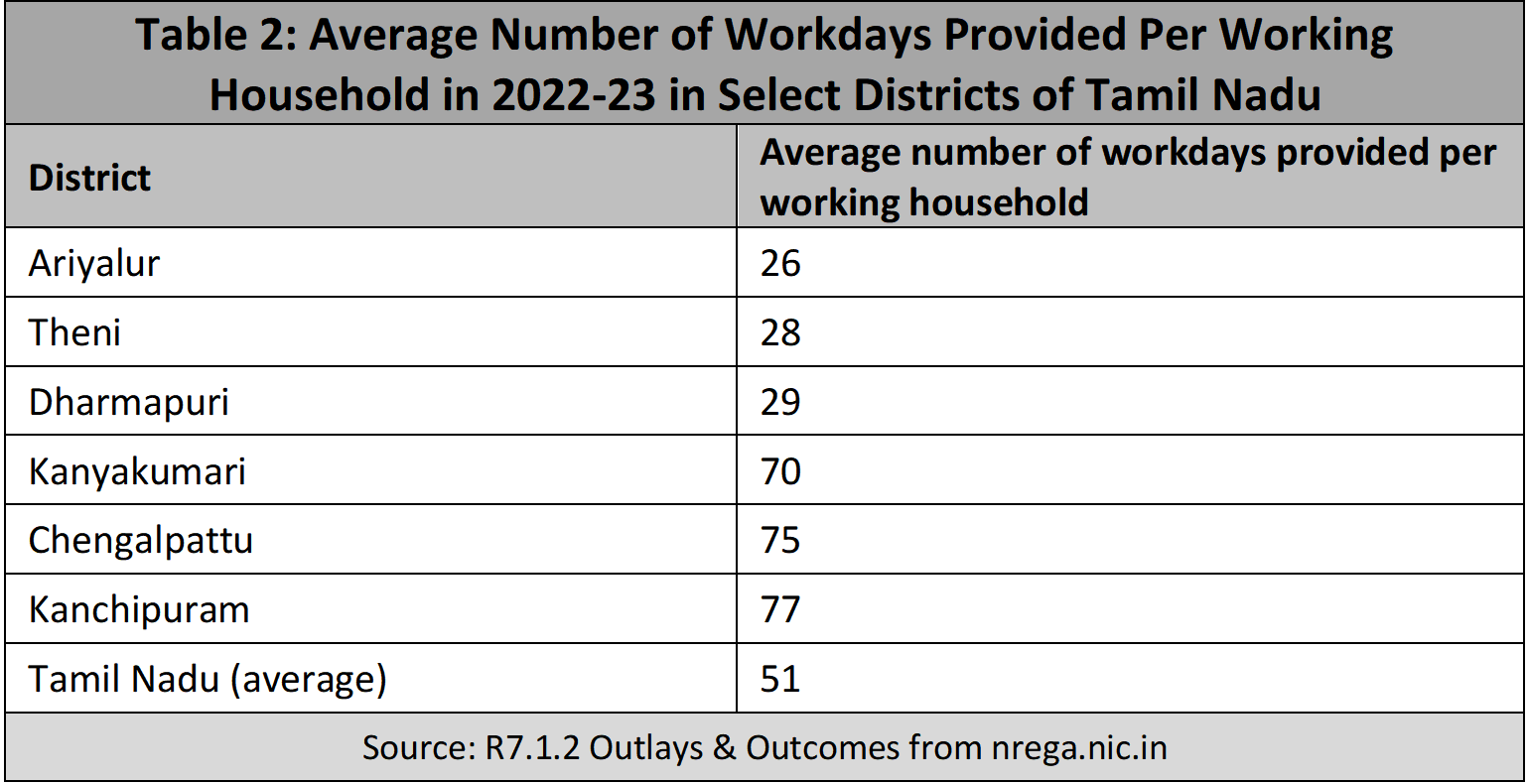
While “backward” districts such as Ariyalur and Dharmapuri provided the lowest number of work days per household, districts such as Kanyakumari and Kanchipuram provided the highest number of work days per household. Melanikuzhi Gram Panchayat President Muthu said that he has asked for the number of clusters in his gram panchayat in Jeyakondam block of Ariyalur district to be increased so that more work days could be provided. But the district officials had not done anything. He also said that the gram panchayat had not received administrative approval for the works put forward by it.
The variation is there even within gram panchayats, as data from Kambur Gram Panchayat in Kottampatti block of Madurai district indicates. Here, the people living in some hamlets are provided more workdays than others (Table 3).

The amount of work that a rural household receives depends on many factors such as whether the district and block administration is committed to implementing the scheme well, the number of clusters in the gram panchayat, the number of job card holders in its cluster, and whether its elected representatives have sufficient clout with the block administration.
Delay in Wages
At the end of October, Chief Minister M.K. Stalin wrote a letter to Minister of Panchayati Raj and Rural Development Giriraj Singh requesting him to immediately release the pending wages of workers in Tamil Nadu, amounting to Rs. 2,696.77 crore. According to the Act, wages should be paid no later than 15 days after the completion of the work. However, wages have not been paid since early August (a delay of nearly three months) because the central government has not released funds. The average wage delay in recent months has been more than 50 days.
While Rs. 113 is a small amount, paying it would comply with the provision in the Act. It would also be an acknowledgement of the delay, and could lead to steps to reduce such delays in the future.
Both the Act and Supreme Court directions have it that a delay in payment of wages should lead to the payment of compensation at the rate of 0.05% a day of the outstanding wages. The central government refuses to pay this compensation and does not even acknowledge the delay. For instance, the “Payment Due” columns in the MGNREGA’s R7.1.1 Financial Statement refers to payments due because of a Stage I delay, which is a state government responsibility, but not because of a Stage II delay, which is the central government’s responsibility.
A rough calculation shows that the central government has to pay Rs. 52 crore as compensation to labourers for the delay referred to in the above letter. The chief minister had said that the public and their representatives had pleaded for the release of the unpaid wages during his visit to the Kattankulathur Panchayat Union in Chengalpattu district. We selected a worker at random from Manivakkam Gram Panchayat, which is in the union, and calculated the compensation due to her till the day of the letter. It came to Rs. 113 Table 4). While this is a small amount and does not truly compensate for the hardship faced by the worker, paying it would comply with the provision in the Act. It would also be an acknowledgement of the delay, and could lead to steps to reduce such delays in the future.
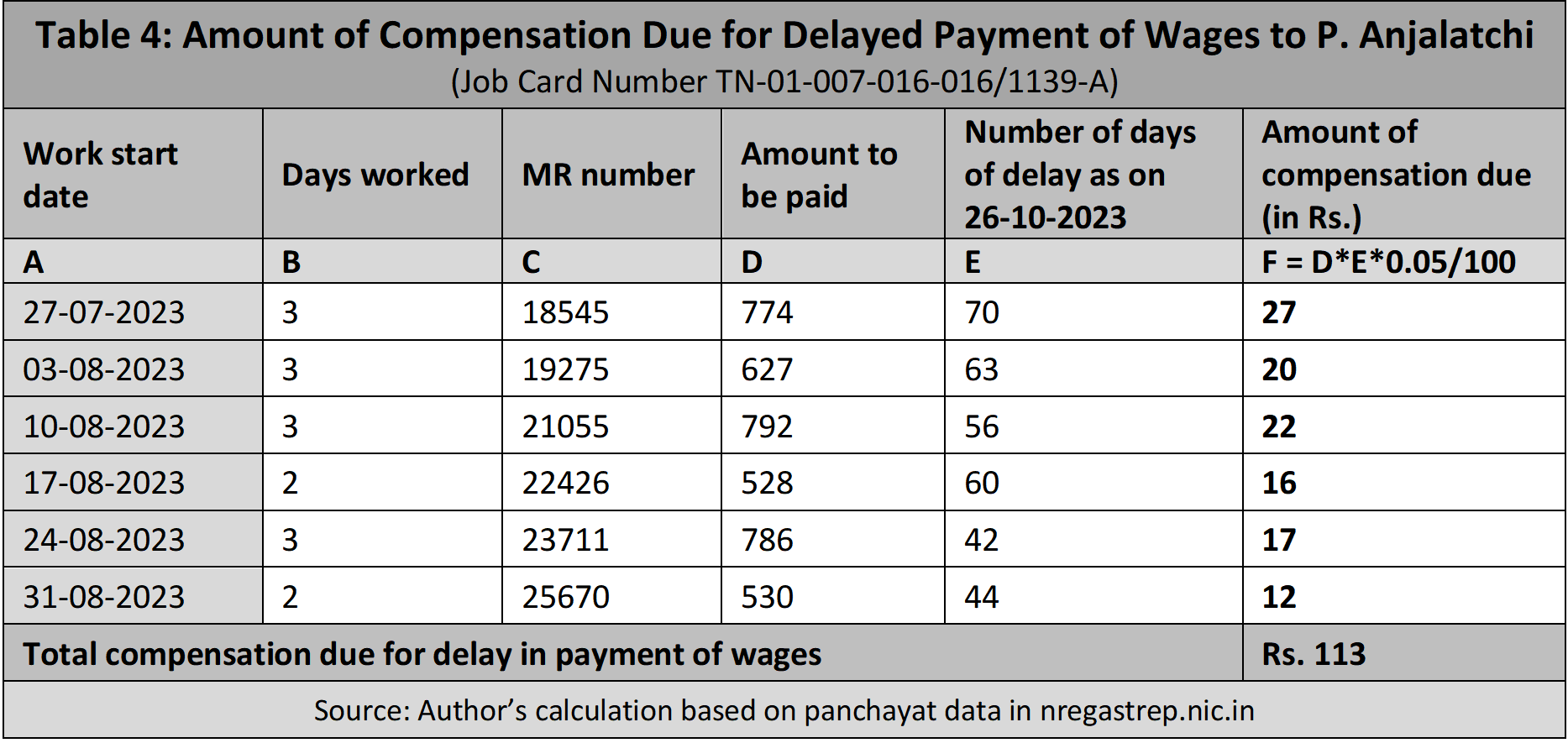
No Planning Exercise
The Act prescribes that a systematic planning exercise should be carried out in every gram panchayat to prepare a list of projects and the labour budget for it. However, a recent study by two organisations (IGG and Thannatchi) found that this is not done in Tamil Nadu. Most of the frontline functionaries of gram panchayats are not even aware that this needs to be done. The management information system requires that the labour budget data be entered in December every year. Since the planning exercise is not carried out, block officials enter the data in the system based on previous figures (such as the number of person-days provided in the last year).
Gram panchayats are asked to select from within a narrow list of works and even here, administrative sanction is not provided for works that deserve the highest priority.
Ideally, gram panchayat functionaries should be aware of all the 268 different types of work that can be done under the MGNREGA; they should conduct a planning exercise to identify the works that can be done; and the gram sabha should approve a prioritised list of works. Administrative sanction is usually provided for these projects. However, in practice, all this does not happen.
Gram panchayats are asked to select from within a narrow list of works and even here, administrative sanction is not provided for works that deserve the highest priority. For instance, Prathamaramapuram Panchayat President Sivarasu said that administrative sanction for works such as roads were not evenly distributed among all gram panchayats in Keelaiyur block of Nagapattinam district. Some gram panchayats were also asked to take up works that they did not ask for.
State officials make announcements every year in the legislature about the different types of works that will be undertaken and fix targets for each district, which are transmitted down to gram panchayats. An example of this can be seen in an administrative sanction order issued by the Collector of Tiruchirapalli district. The district had planned to lay “cement concrete pavements” for a length of 95 km but the state sanctioned only 27 km. The district did not ask for farm ponds but was given a target of constructing 204 farm ponds in that year.
Less Transparency
Workers in Tamil Nadu are not provided with pay slips, as mandated by the Act’s guidelines. Most workers do not know when they will be paid, what the daily wage rate is, and for which period they were last paid. This, and the non-availability of bank pass books, makes it easier for some banking correspondents to cheat them of their hard-earned money.
Mohan Kumar of the Tamil Nadu Agricultural Labourers’ Union in Erode district said that they used to print the pay slips when they were available on the MGNREGA website and distribute them. In addition to this being very useful for the labourers, it helped identify people who did not work but had been paid. He felt that the state government should take steps to distribute pay slips to all workers.
Figure 1: Copy of Pay Slip Given to a Worker in Erode District
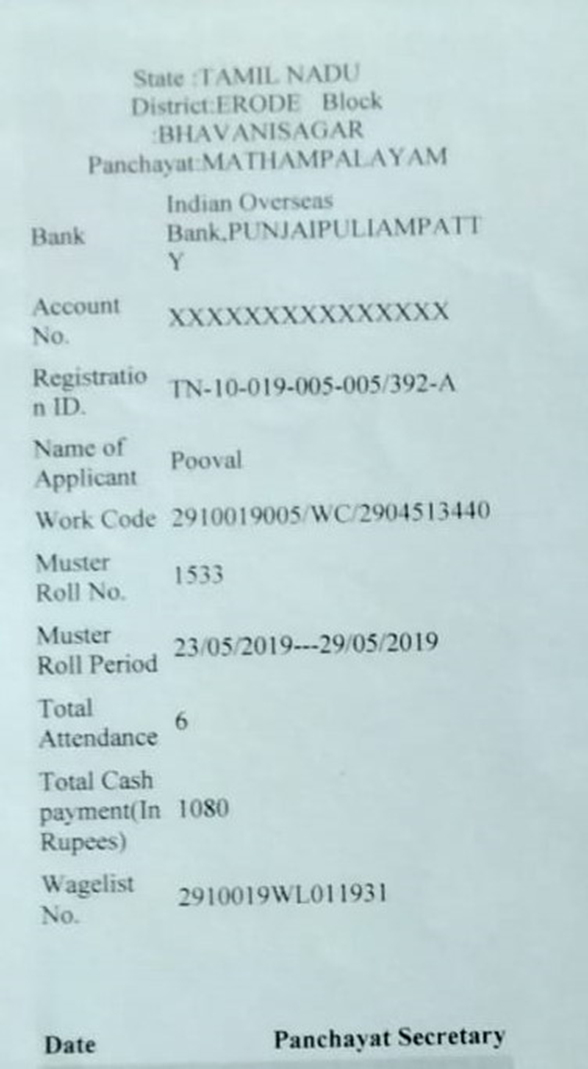
Low Administrative Expenditure
The rural employment guarantee scheme’s guidelines provide for spending 6% of the total expenditure on administrative costs but Tamil Nadu spent only 3.1% of it in 2022-23. This low spending has a big impact on the quality of the work done. For a long time, the state did not have a separate employment guarantee assistant (or gram rozgar sahayak). To accommodate employees retrenched by the previous government, the present government recently appointed people from among them as “MGNREGS scheme co-ordinators” in each gram panchayat.
Sometimes people who do not need work under the Act are given job cards and fake muster rolls are created …. Such practices need to be stopped, especially because 24% of the scheme’s total expenditure was spent on materials last year.
There is a paucity of staff and each overseer has to manage between five and eight gram panchayats. The number of assistant engineers is also less than desirable at the block level. The upshot of this is that the technical team takes a long time to process proposals, and it is not comfortable with new project proposals. It also does not have the time to make frequent visits to worksites.
The state rural development and panchayat raj department has issued a circular for providing reimbursement for expenditure made at the panchayat level but this is not paid. Some elected representatives claim that they have to resort to adding non-workers to the muster rolls to even meet their legitimate expenses.
Works by Contractors
While contractors and machines are banned under the MGNREGA, most works that use material (such as sand, bricks, and cement) are implemented by contractors who do not employ job card holders. Among the many reasons for this are indifferent officials; interfering political representatives at the block level; and gram panchayats with no good technical support. Add to these the delay in paying for materials and the kickbacks contractors pay to all frontline personnel and elected representatives.
Sometimes people who do not need work under the Act are given job cards and fake muster rolls are created. This facilitates withdrawing money, as in this example from Coimbatore and Tiruppur. Such practices need to be stopped, especially because 24% of the scheme’s total expenditure was spent on materials last year.
Social Audits
While social audits are mandated in the Act, it took around 10 years to implement this in a reasonable manner across the country. However, over the last few years, it has taken a beating because of the poor release of funds by the union ministry. Though the guidelines mandate 0.5% of the previous year’s expenditure for social audit, the percentage of funds released is less than half of that and even that is not paid on time.
Tamil Nadu has set up a social audit unit but it is not independent. The governing body does not have any civil society members and it is filled with implementation officials. The senior level of the unit has officers from the rural development and panchayat raj department, which is implementing the rural employment guarantee scheme.
The social audit unit does not have a website yet and its social audit reports and action taken reports are not in the public domain. The Act specifies a block-level public hearing after the audit process at the gram sabha. But Tamil Nadu has a “high level committee” whose members include the key personnel implementing the programme at the block and district level. This committee drops most issues without taking any action. Even in cases when it orders recovery, no administrative action is taken against the officials responsible for the problem. The unit has reported financial misappropriation of more than Rs. 386 crore, but only 9% of this has been recovered.
Following reports of widespread corruption among block and district resource persons who led teams facilitating the social audit in gram panchayats, the department has decided to not renew their annual contracts. The social audit by gram sabhas was facilitated by a team headed by a block resource person from the social audit unit and other village resource persons.
Now, the social audit unit plans to carry out the audits by using just the village resource persons. The quality of such audits may be poor because village resource persons have not undergone the 30-day training programme mandated by the ministry and also because they will have little experience (they carry out only one audit a year).
Technical Changes
Tamil Nadu has managed to implement the employment guarantee scheme in a better manner than many other states despite frequent technical disruptions by the union ministry of rural development. The ministry should reduce its reliance on technical fixes to monitor the programme (which tend to cause severe disruptions in the field) and instead provide more support for community monitoring, a concurrent audit and social audit, including the release of the full 0.5% of the previous year’s expenditure to social audit units.
Recommendations
The union government should substantially increase the amount allocated for the rural employment guarantee scheme in the next year so that all households are able to get work for a full 100 days. Tamil Nadu had requested allocations for 40 crore person-days for 2023-24 but was sanctioned funds for only 28 crore person-days. This work was completed in the first six months of the financial year. The union government should also ensure that the funds to pay wages and for materials are released on time.
The Ministry of Rural Development should acknowledge Stage II delays (show them in the management information system reports) and pay compensation when it is responsible for the delay. As mentioned, it should rely less on technical fixes to monitor the programme and instead provide more support for community monitoring and social audits.
Tamil Nadu can do a lot more to improve the implementation of the scheme and ensure that the objectives mentioned in the Act are fully realised. Some suggestions towards this are empowering workers so that they are aware of the rights guaranteed under the Act and are able to demand them; improving the grievance redressal system; and forming labour groups. A system to allocate work based on demand has to be put in place, and transparency has to be improved (by distributing pay slips to workers, and sharing annual gram panchayat reports with self-help groups and ward members, and placing a copy in the gram panchayat library).
Community monitoring and social audit have to be strengthened; capacity has to be built among representatives of panchayati raj institutions; and the participatory planning exercise has to be compulsorily carried out by every gram panchayat. While the prioritised list of works approved by gram sabhas have to be sanctioned, contractors must be barred from taking up works, and there must be zero tolerance for corruption.
Other factors that deserve importance are setting up a quality control unit, and increasing the administrative expenditure so that sufficient staff can be hired to provide adequate support to gram panchayats. This is the way to build productive assets that increase the livelihood base of the poor under the rural employment guarantee scheme.
Karuna M. is an independent researcher and activist, based in Tamil Nadu.

